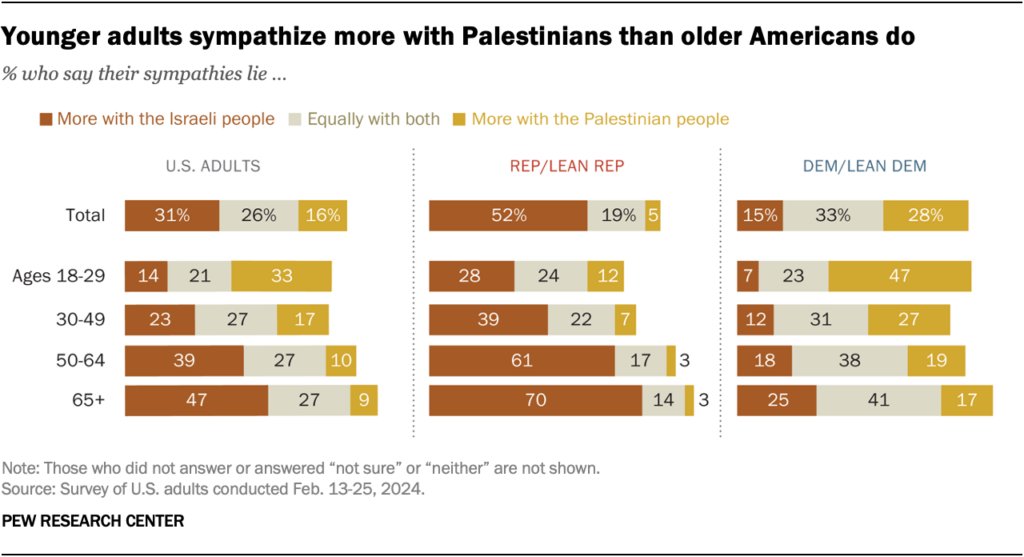The Israel-Hamas war has stirred varying sentiments across different demographics in the United States, with Americans under 30 showing distinct perspectives compared to their older counterparts.
Pew Research found that 33% of adults under 30 express their sympathies either entirely or mostly with the Palestinian people, while 14% declare their sympathies lie entirely or mostly with the Israeli people. The remaining individuals state their sympathies are equally shared, are with neither, or that they are uncertain.
In contrast to younger demographics, older Americans exhibit a higher propensity to align themselves with the Israeli population rather than the Palestinians. For instance, within the age group of 65 and above, a significant 47% express their sympathies predominantly towards the Israeli populace, in stark comparison to the mere 9% who show similar sentiments towards the Palestinians. This sentiment reflects a trend where experience and historical perspectives may play a pivotal role in shaping perceptions towards this enduring geopolitical issue.

This divide is not just a reflection of generational differences in political and social beliefs but is also a commentary on how younger populations engage with global conflicts and their implications on domestic and international policy.
Understanding the Shift: Why Younger Americans View the Israel-Hamas War Differently
Younger Americans are increasingly informed by a globalized view of justice and equity, which colors their perceptions of international conflicts. Social media and digital news consumption, which are more prevalent among this demographic, also play a crucial role in shaping their views. This segment is more likely to encounter and engage with diverse narratives, which can lead to a broader, sometimes more critical, perspective on international affairs. For instance, it’s easy to assume that Israel, with its far superior weaponry, is acting as the bully. As a result, some may sympathize with the Palestinians without taking into account their long history of violence against each other.
The Impact of Media and Education on Young Minds
The way younger generations consume information significantly impacts their opinions about the Israel-Hamas conflict. Educational curriculums that focus more on critical thinking and the ethical implications of foreign policy, combined with a media landscape that includes voices from across the globe, contribute to these differing views.
Analyzing Survey Data: Sympathies Laid Bare
Recent surveys, such as the one conducted by the Pew Research Center, reveal stark differences in sympathies towards the Israelis and Palestinians between different age groups. These findings suggest a shift towards more empathetic perspectives towards Palestinians among younger Americans, contrasting with older Americans’ views.
Partisan Lines and Their Influence
Political affiliations also significantly influence perspectives within age demographics. Younger Democrats and Republicans differ markedly in their views on the Israel-Hamas war, reflecting broader national partisan divides.
The Role of Social Justice Movements
The rise of social justice movements has had a profound impact on younger Americans’ views. Movements like Black Lives Matter and advocacy against anti-Muslim bigotry resonate with many young people, influencing how they perceive foreign conflicts that involve issues of oppression.
Younger Americans’ Views on Israeli Policies
There is a growing tendency among younger Americans to scrutinize the policies and actions of the Israeli government more critically. This is evident in their reactions to specific events and policies that are seen as controversial or oppressive.
Hamas’ Perception Among the Youth
Conversely, there is also a nuanced view of Hamas among younger Americans. While there is some sympathy for the Palestinian cause, there is also a critical approach to the tactics and strategies employed by Hamas, which are often seen as counterproductive or harmful.
Impact of U.S. Foreign Policy on Young Minds
U.S. foreign policy, especially regarding the Middle East, has significant repercussions on domestic opinions. Younger Americans’ critical views on the Israel-Hamas war are often intertwined with their perceptions of U.S. involvement in the region.
Future Implications: How Younger Views Could Reshape U.S. Policies
The distinct perspectives of younger Americans on the Israel-Hamas conflict could have long-term implications for U.S. foreign policy, potentially leading to shifts in how the U.S. engages with the Middle East.
Conclusion: Bridging the Gap Between Generations
Understanding and addressing the differences in how younger and older Americans view the Israel-Hamas war is crucial for fostering dialogue and developing policies that reflect the diverse views of the American populace. As younger generations become more politically active, their influence on American foreign policy and international relations is likely to increase, necessitating a more nuanced and inclusive approach to global conflicts.

